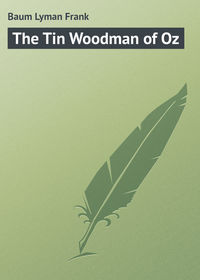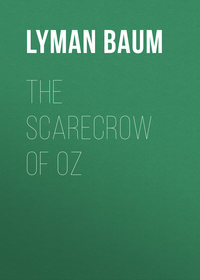
Полная версия
The Road to Oz / Путешествие в Страну Оз. Книга для чтения на английском языке
“We’re pretty well, thank you, Shaggy Man,” said he; and Dorothy knew that the Love Magnet was working and that all the foxes now loved the shaggy man because of it. But Toto didn’t know this, for he began barking angrily and tried to bite the captain’s hairy leg where it showed between his red boots and his yellow pantaloons.
“Stop, Toto!” cried the little girl, seizing the dog in her arms. “These are our friends.”
“Why, so we are!” remarked the captain in tones of astonishment. “I thought at first we were enemies, but it seems you are friends instead. You must come with me to see King Dox.”
“Who’s he?” asked Button-Bright, with earnest eyes.
“King Dox of Foxville; the great and wise sovereign who rules over our community.”
“What’s sov’rin, and what’s c’u’nity?” inquired Button-Bright.
“Don’t ask so many questions, little boy.”
“Why?”
“Ah, why indeed?” exclaimed the captain, looking at Button-Bright admiringly. “If you don’t ask questions you will learn nothing. True enough. I was wrong. You’re a very clever little boy, come to think of it[8] – very clever indeed. But now, friends, please come with me, for it is my duty to escort you at once to the royal palace.”
The soldiers marched back through the arch again, and with them marched the shaggy man, Dorothy, Toto, and Button-Bright. Once through the opening they found a fine, big city spread out before them, all the houses of carved marble in beautiful colors. The decorations were mostly birds and other fowl, such as peacocks, pheasants, turkeys, prairie-chickens, ducks, and geese. Over each doorway was carved a head representing the fox who lived in that house, this effect being quite pretty and unusual.
As our friends marched along, some of the foxes came out on the porches and balconies to get a view of the strangers. These foxes were all handsomely dressed, the girl-foxes and women-foxes wearing gowns of feathers woven together effectively and colored in bright hues which Dorothy thought were quite artistic and decidedly attractive.
Button-Bright stared until his eyes were big and round, and he would have stumbled and fallen more than once had not the shaggy man grasped his hand tightly. They were all interested, and Toto was so excited he wanted to bark every minute and to chase and fight every fox he caught sight of; but Dorothy held his little wiggling body fast in her arms and commanded him to be good and behave himself. So he finally quieted down, like a wise doggy, deciding there were too many foxes in Foxville to fight at one time.
By-and-by they came to a big square, and in the center of the square stood the royal palace. Dorothy knew it at once because it had over its great door the carved head of a fox just like the one she had seen on the arch, and this fox was the only one who wore a golden crown.
There were many fox-soldiers guarding the door, but they bowed to the captain and admitted him without question. The captain led them through many rooms, where richly dressed foxes were sitting on beautiful chairs or sipping tea, which was being passed around by fox-servants in white aprons. They came to a big doorway covered with heavy curtains of cloth of gold.
Beside this doorway stood a huge drum. The fox-captain went to this drum and knocked his knees against it – first one knee and then the other – so that the drum said: “Boom-boom.”
“You must all do exactly what I do,” ordered the captain; so the shaggy man pounded the drum with his knees, and so did Dorothy and so did Button-Bright. The boy wanted to keep on pounding it with his little fat knees, because he liked the sound of it; but the captain stopped him. Toto couldn’t pound the drum with his knees and he didn’t know enough to wag his tail against it, so Dorothy pounded the drum for him and that made him bark, and when the little dog barked the fox-captain scowled.
The golden curtains drew back far enough to make an opening, through which marched the captain with the others.
The broad, long room they entered was decorated in gold with stained-glass windows of splendid colors. In the corner of the room upon a richly carved golden throne, sat the fox-king, surrounded by a group of other foxes, all of whom wore great spectacles over their eyes, making them look solemn and important.
Dorothy knew the King at once, because she had seen his head carved on the arch and over the doorway of the palace. Having met with several other kings in her travels, she knew what to do, and at once made a low bow before the throne. The shaggy man bowed, too, and Button-Bright bobbed his head and said “Hello.”
“Most wise and noble Potentate of Foxville,” said the captain, addressing the King in a pompous voice, “I humbly beg to report that I found these strangers on the road leading to your Foxy Majesty’s dominions, and have therefore brought them before you, as is my duty.”
“So – so,” said the King, looking at them keenly. “What brought you here[9], strangers?”
“Our legs, may it please your Royal Hairiness,” replied the shaggy man.
“What is your business here?” was the next question.
“To get away as soon as possible,” said the shaggy man.
The King didn’t know about the Magnet, of course; but it made him love the shaggy man at once.
“Do just as you please about going away,” he said; “but I’d like to show you the sights of my city and to entertain your party while you are here. We feel highly honored to have little Dorothy with us, I assure you, and we appreciate her kindness in making us a visit. For whatever country Dorothy visits is sure to become famous.”
This speech greatly surprised the little girl, who asked:
“How did your Majesty know my name?”
“Why, everybody knows you, my dear,” said the Fox-King. “Don’t you realize that? You are quite an important personage since Princess Ozma of Oz made you her friend.”
“Do you know Ozma?” she asked, wondering.
“I regret to say that I do not,” he answered, sadly; “but I hope to meet her soon. You know the Princess Ozma is to celebrate her birthday on the twenty-first of this month.”
“Is she?” said Dorothy. “I didn’t know that.”
“Yes; it is to be the most brilliant royal ceremony ever held in any city in Fairyland, and I hope you will try to get me an invitation.”
Dorothy thought a moment.
“I’m sure Ozma would invite you if I asked her,” she said; “but how could you get to the Land of Oz and the Emerald City? It’s a good way[10] from Kansas.”
“Kansas!” he exclaimed, surprised.
“Why, yes; we are in Kansas now, aren’t we?” she returned.
“What a queer notion!” cried the Fox-King, beginning to laugh. “Whatever made you think this is Kansas?”
“I left Uncle Henry’s farm only about two hours ago; that’s the reason,” she said, rather perplexed.
“But, tell me, my dear, did you ever see so wonderful a city as Foxville in Kansas?” he questioned.
“No, your Majesty.”
“And haven’t you traveled from Oz to Kansas in less than half a jiffy[11], by means of the Silver Shoes and the Magic Belt?”
“Yes, your Majesty,” she acknowledged.
“Then why do you wonder that an hour or two could bring you to Foxville, which is nearer to Oz than it is to Kansas?”
“Dear me!” exclaimed Dorothy; “is this another fairy adventure?”
“It seems to be,” said the Fox-King, smiling.
Dorothy turned to the shaggy man, and her face was grave and reproachful.
“Are you a magician? or a fairy in disguise?” she asked. “Did you enchant me when you asked the way to Butterfield?”
The shaggy man shook his head.
“Who ever heard of a shaggy fairy?” he replied. “No, Dorothy, my dear; I’m not to blame for this journey in any way, I assure you. There’s been something strange about me ever since I owned the Love Magnet; but I don’t know what it is any more than you do. I didn’t try to get you away from home, at all. If you want to find your way back to the farm I’ll go with you willingly, and do my best to help you.”
“Never mind,” said the little girl, thoughtfully. “There isn’t so much to see in Kansas as there is here, and I guess Aunt Em won’t be VERY much worried; that is, if I don’t stay away too long.”
“That’s right,” declared the Fox-King, nodding approval. “Be contented with your lot[12], whatever it happens to be, if you are wise. Which reminds me that you have a new companion on this adventure – he looks very clever and bright.”
“He is,” said Dorothy; and the shaggy man added:
“That’s his name, your Royal Foxiness – Button-Bright.”
4
King Dox
It was amusing to note the expression on the face of King Dox as he looked the boy over, from his sailor hat to his stubby shoes, and it was equally diverting to watch Button-Bright stare at the King in return. No fox ever beheld a fresher, fairer child’s face, and no child had ever before heard a fox talk, or met with one who dressed so handsomely and ruled so big a city. I am sorry to say that no one had ever told the little boy much about fairies of any kind; this being the case[13], it is easy to understand how much this strange experience startled and astonished him.
“How do you like us?” asked the King.
“Don’t know,” said Button-Bright.
“Of course you don’t. It’s too short an acquaintance,” returned his Majesty. “What do you suppose my name is?”
“Don’t know,” said Button-Bright.
“How should you? Well, I’ll tell you. My private name is Dox, but a King can’t be called by his private name; he has to take one that is official. Therefore my official name is King Renard the Fourth. Renard with the accent on the ‘Ren’.”
“What’s ‘ren’?” asked Button-Bright.
“How clever!” exclaimed the King, turning a pleased face toward his counselors. “This boy is indeed remarkably bright. ‘What’s “ren”?’ he asks; and of course ‘ren’ is nothing at all, all by itself. Yes, he’s very bright indeed.”
“That question is what your Majesty might call foxy,” said one of the counselors, an old grey fox.
“So it is,” declared the King. Turning again to Button-Bright, he asked:
“Having told you my name, what would you call me?”
“King Dox,” said the boy.
“Why?”
“’cause ‘ren’s’ nothing at all,” was the reply.
“Good! Very good indeed! You certainly have a brilliant mind. Do you know why two and two make four?”
“No,” said Button-Bright.
“Clever! clever indeed! Of course you don’t know. Nobody knows why; we only know it’s so, and can’t tell why it’s so. Button-Bright, those curls and blue eyes do not go well with so much wisdom. They make you look too youthful, and hide your real cleverness. Therefore, I will do you a great favor. I will confer upon you the head of a fox, so that you may hereafter look as bright as you really are.”
As he spoke the King waved his paw toward the boy, and at once the pretty curls and fresh round face and big blue eyes were gone, while in their place a fox’s head appeared upon Button-Bright’s shoulders – a hairy head with a sharp nose, pointed ears, and keen little eyes.
“Oh, don’t do that!” cried Dorothy, shrinking back from her transformed companion with a shocked and dismayed face.
“Too late, my dear; it’s done. But you also shall have a fox’s head if you can prove you’re as clever as Button-Bright.”
“I don’t want it; it’s dreadful!” she exclaimed; and, hearing this verdict, Button-Bright began to boo-hoo just as if he were still a little boy.
“How can you call that lovely head dreadful?” asked the King. “It’s a much prettier face than he had before, to my notion, and my wife says I’m a good judge of beauty. Don’t cry, little fox-boy. Laugh and be proud, because you are so highly favored. How do you like the new head, Button-Bright?”
“D-d-don’t n-n-n-know!” sobbed the child.
“Please, PLEASE change him back again, your Majesty!” begged Dorothy.
King Renard IV shook his head.
“I can’t do that,” he said; “I haven’t the power, even if I wanted to. No, Button-Bright must wear his fox head, and he’ll be sure to love it dearly as soon as he gets used to it.”
Both the shaggy man and Dorothy looked grave and anxious, for they were sorrowful that such a misfortune had overtaken their little companion. Toto barked at the fox-boy once or twice, not realizing it was his former friend who now wore the animal head; but Dorothy cuffed the dog and made him stop. As for the foxes, they all seemed to think Button-Bright’s new head very becoming and that their King had conferred a great honor on this little stranger. It was funny to see the boy reach up to feel of his sharp nose and wide mouth, and wail afresh with grief. He wagged his ears in a comical manner and tears were in his little black eyes. But Dorothy couldn’t laugh at her friend just yet, because she felt so sorry.
Just then three little fox-princesses, daughters of the King, entered the room, and when they saw Button-Bright one exclaimed: “How lovely he is!” and the next one cried in delight: “How sweet he is!” and the third princess clapped her hands with pleasure and said, “How beautiful he is!”
Button-Bright stopped crying and asked timidly:
“Am I?”
“In all the world there is not another face so pretty,” declared the biggest fox-princess.
“You must live with us always, and be our brother,” said the next.
“We shall all love you dearly,” the third said.
This praise did much to comfort the boy, and he looked around and tried to smile. It was a pitiful attempt, because the fox face was new and stiff, and Dorothy thought his expression more stupid than before the transformation.
“I think we ought to be going now,” said the shaggy man, uneasily, for he didn’t know what the King might take into his head to do next.
“Don’t leave us yet, I beg of you,” pleaded King Renard. “I intend to have several days of feasting and merry-making in honor of your visit.”
“Have it after we’re gone, for we can’t wait,” said Dorothy, decidedly. But seeing this displeased the King, she added: “If I’m going to get Ozma to invite you to her party I’ll have to find her as soon as poss’ble, you know.”
In spite of all the beauty of Foxville and the gorgeous dresses of its inhabitants, both the girl and the shaggy man felt they were not quite safe there, and would be glad to see the last of it[14].
“But it is now evening,” the King reminded them, “and you must stay with us until morning, anyhow. Therefore, I invite you to be my guests at dinner, and to attend the theater afterward and sit in the royal box. To-morrow morning, if you really insist upon it, you may resume your journey.”
They consented to this, and some of the fox-servants led them to a suite of lovely rooms in the big palace.
Button-Bright was afraid to be left alone, so Dorothy took him into her own room. While a maid-fox dressed the little girl’s hair – which was a bit tangled – and put some bright, fresh ribbons in it, another maid-fox combed the hair on poor Button-Bright’s face and head and brushed it carefully, tying a pink bow to each of his pointed ears. The maids wanted to dress the children in fine costumes of woven feathers, such as all the foxes wore; but neither of them consented to that.
“A sailor suit and a fox head do not go well together[15],” said one of the maids, “for no fox was ever a sailor that I can remember.”
“I’m not a fox!” cried Button-Bright.
“Alas, no,” agreed the maid. “But you’ve got a lovely fox head on your skinny shoulders, and that’s ALMOST as good as being a fox.”
The boy, reminded of his misfortune, began to cry again. Dorothy petted and comforted him and promised to find some way to restore him his own head.
“If we can manage to get to Ozma,” she said, “the Princess will change you back to yourself in half a second; so you just wear that fox head as comf’t’bly as you can, dear, and don’t worry about it at all. It isn’t nearly as pretty as your own head, no matter what the foxes say; but you can get along with it for a little while longer, can’t you?”
“Don’t know,” said Button-Bright, doubtfully; but he didn’t cry any more after that.
Dorothy let the maids pin ribbons to her shoulders, after which they were ready for the King’s dinner. When they met the shaggy man in the splendid drawing-room of the palace they found him just the same as before. He had refused to give up his shaggy clothes for new ones, because if he did that he would no longer be the shaggy man, he said, and he might have to get acquainted with himself all over again.
He told Dorothy he had brushed his shaggy hair and whiskers; but she thought he must have brushed them the wrong way, for they were quite as shaggy as before.
As for the company of foxes assembled to dine with the strangers, they were most beautifully costumed, and their rich dresses made Dorothy’s simple gown and Button-Bright’s sailor suit and the shaggy man’s shaggy clothes look commonplace. But they treated their guests with great respect and the King’s dinner was a very good dinner indeed. Foxes, as you know, are fond of chicken and other fowl; so they served chicken soup and roasted turkey and stewed duck and fried grouse and broiled quail and goose pie, and as the cooking was excellent the King’s guests enjoyed the meal and ate heartily of the various dishes.
The party went to the theater, where they saw a play acted by foxes dressed in costumes of brilliantly colored feathers. The play was about a fox-girl who was stolen by some wicked wolves and carried to their cave; and just as they were about to kill her and eat her a company of fox-soldiers marched up, saved the girl, and put all the wicked wolves to death.
“How do you like it?” the King asked Dorothy.
“Pretty well,” she answered. “It reminds me of one of Mr. Aesop[16]’s fables.”
“Don’t mention Aesop to me, I beg of you!” exclaimed King Dox. “I hate that man’s name. He wrote a good deal about foxes, but always made them out cruel and wicked, whereas we are gentle and kind, as you may see.”
“But his fables showed you to be wise and clever, and more shrewd than other animals,” said the shaggy man, thoughtfully.
“So we are. There is no question about our knowing more than men do,” replied the King, proudly. “But we employ our wisdom to do good, instead of harm; so that horrid Aesop did not know what he was talking about.”
They did not like to contradict him, because they felt he ought to know the nature of foxes better than men did; so they sat still and watched the play, and Button-Bright became so interested that for the time he forgot he wore a fox head.
Afterward they went back to the palace and slept in soft beds stuffed with feathers; for the foxes raised many fowl for food, and used their feathers for clothing and to sleep upon.
Dorothy wondered why the animals living in Foxville did not wear just their own hairy skins as wild foxes do; when she mentioned it to King Dox he said they clothed themselves because they were civilized.
“But you were born without clothes,” she observed, “and you don’t seem to me to need them.”
“So were human beings born without clothes,” he replied; “and until they became civilized they wore only their natural skins. But to become civilized means to dress as elaborately and prettily as possible, and to make a show of your clothes so your neighbors will envy you, and for that reason both civilized foxes and civilized humans spend most of their time dressing themselves.”
“I don’t,” declared the shaggy man.
“That is true,” said the King, looking at him carefully; “but perhaps you are not civilized.”
After a sound sleep and a good night’s rest they had their breakfast with the King and then bade his Majesty good-bye.
“You’ve been kind to us – ’cept poor Button-Bright,” said Dorothy, “and we’ve had a nice time in Foxville.”
“Then,” said King Dox, “perhaps you’ll be good enough to get me an invitation to Princess Ozma’s birthday celebration.”
“I’ll try,” she promised; “if I see her in time.”
“It’s on the twenty-first, remember,” he continued; “and if you’ll just see that I’m invited I’ll find a way to cross the Dreadful Desert into the marvelous Land of Oz. I’ve always wanted to visit the Emerald City, so I’m sure it was fortunate you arrived here just when you did, you being Princess Ozma’s friend and able to assist me in getting the invitation.”
“If I see Ozma I’ll ask her to invite you,” she replied.
The Fox-King had a delightful luncheon put up for them, which the shaggy man shoved in his pocket, and the fox-captain escorted them to an arch at the side of the village opposite the one by which they had entered. Here they found more soldiers guarding the road.
“Are you afraid of enemies?” asked Dorothy.
“No; because we are watchful and able to protect ourselves,” answered the captain. “But this road leads to another village peopled by big, stupid beasts who might cause us trouble if they thought we were afraid of them.”
“What beasts are they?” asked the shaggy man.
The captain hesitated to answer. Finally, he said:
“You will learn all about them when you arrive at their city. But do not be afraid of them. Button-Bright is so wonderfully clever and has now such an intelligent face that I’m sure he will manage to find a way to protect you.”
This made Dorothy and the shaggy man rather uneasy, for they had not so much confidence in the fox-boy’s wisdom as the captain seemed to have. But as their escort would say no more about the beasts, they bade him good-bye and proceeded on their journey.
5
The Rainbow’s Daughter
Toto, now allowed to run about as he pleased, was glad to be free again and able to bark at the birds and chase the butterflies. The country around them was charming, yet in the pretty fields of wild flowers and groves of leafy trees were no houses whatever, or sign of any inhabitants. Birds flew through the air and cunning white rabbits darted amongst the tall grasses and green bushes; Dorothy noticed even the ants toiling busily along the roadway, bearing gigantic loads of clover seed; but of people there were none at all.
They walked briskly on for an hour or two, for even little Button-Bright was a good walker and did not tire easily. At length as they turned a curve in the road they beheld just before them a curious sight.
A little girl, radiant and beautiful, shapely as a fairy and exquisitely dressed, was dancing gracefully in the middle of the lonely road, whirling slowly this way and that, her dainty feet twinkling in sprightly fashion. She was clad in flowing, fluffy robes of soft material that reminded Dorothy of woven cobwebs, only it was colored in soft tintings of violet, rose, topaz, olive, azure, and white, mingled together most harmoniously in stripes which melted one into the other with soft blendings. Her hair was like spun gold and flowed around her in a cloud, no strand being fastened or confined by either pin or ornament or ribbon.
Filled with wonder and admiration our friends approached and stood watching this fascinating dance. The girl was no taller than Dorothy, although more slender; nor did she seem any older than our little heroine.
Suddenly she paused and abandoned the dance, as if for the first time observing the presence of strangers. As she faced them, shy as a frightened fawn, poised upon one foot as if to fly the next instant, Dorothy was astonished to see tears flowing from her violet eyes and trickling down her lovely rose-hued cheeks. That the dainty maiden should dance and weep at the same time was indeed surprising; so Dorothy asked in a soft, sympathetic voice:
“Are you unhappy, little girl?”
“Very!” was the reply; “I am lost.”
“Why, so are we,” said Dorothy, smiling; “but we don’t cry about it.”
“Don’t you? Why not?”
“’cause I’ve been lost before, and always got found again,” answered Dorothy simply.
“But I’ve never been lost before,” murmured the dainty maiden, “and I’m worried and afraid.”
“You were dancing,” remarked Dorothy, in a puzzled tone of voice.
“Oh, that was just to keep warm,” explained the maiden, quickly. “It was not because I felt happy or gay, I assure you.”
Dorothy looked at her closely. Her gauzy flowing robes might not be very warm, yet the weather wasn’t at all chilly, but rather mild and balmy, like a spring day.
“Who are you, dear?” she asked, gently.
“I’m Polychrome,” was the reply.












